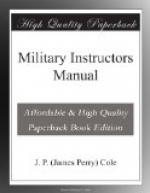1. The platoon leader’s
assistant and may be assigned any duty the
platoon leader
sees fit.
2. Keeps adjoining units under
observation.
3. Watches firing line.
4. Checks every breach of fire
discipline.
5. Prevents skulking, men leaving
the ranks at any time to care for
wounded, etc.
6. Designates new squad leaders
and organizes new squads when
necessary.
7. Attaches men that have become
separated from squads to other
squads.
8. Insures prompt and orderly
advance.
9. On joining firing line from
the support takes over duties of
sergeants disabled.
10. May receive and transmit signals
to the Captain.
11. If the platoon leader is disabled,
he takes over his duties.
Hence he should
know what the platoon leader is doing and how.
12. When taking over the duties of
the platoon leader he calls the
senior corporal
of his platoon out to act as guide.
X. CORPORAL.
POSITION:
1. Marching in line, as center
skirmisher of squad (124, i.d.r.)
or
2. When skirmish line is halted,
immediately behind his squad.
Note.—The School has
recommended to the War Department that the
Infantry Drill
Regulations be changed to provide that the
Corporal’s
position be as prescribed above and in paragraph 20,
page 10.
DUTIES:
Paragraphs 42, 222, 252, 254, 255,
411, and 551, i.d.r., cover in
general the corporal’s
duties.
The squad leader (Corporal) controls
the fire of his squad, he must
understand the
duties of the private and in issuing his fire
orders:
1. Receives his instructions
from the platoon leader.
2. Points out indicated objective
to his squad.
3. Takes as the squad target
that portion of the platoon target
which corresponds
to the position of the squad in the platoon.
4. Announces sight setting.
5. Announces class and rate
of fire.
6. When his squad is ready
to fire looks toward the platoon leader
and holds up his
hand. At the platoon leader’s signal to
commence firing
he sees that the squad opens fire.
THEREAFTER:
1. Makes all fire from the
shoulder.
2. Makes all use ordered rate
of fire.
3. Insures that all fire at
designated objective.
4. Prevents slighting of invisible
portions of the target for more
visible parts.
5. Prevents men from changing
fire to unauthorized targets not in
the assigned front
or sector.
6. Maintains constant observation
to the front; when squad is
firing, for effect
of fire—when squad is not firing, for
appearance of
enemy.
7. Insures prompt obedience
to orders to suspend and cease firing.




